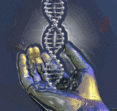#Genemapping
Text
auraboa dragon get me willing to do unethical things for an ideal genemap
4 notes
·
View notes
Text
Gene-mapping champion Iceland leads the way in COVID sequencing
Gene-mapping champion Iceland leads the way in COVID sequencing
The entire process can take up to a day and a half
Iceland has genetically sequenced all its positive COVID-19 cases since the start of the pandemic, an increasingly vital practice as worrying new strains emerge from Britain and South Africa.
The World Health Organization on Friday urged all countries to ramp up genome sequencing to help combat the emerging variants.
Scientists at the Icelandic…

View On WordPress
0 notes
Link

Harvard Biologist George Church wants to turbocharge the evolutionary process by putting new genes into organisms rather than waiting around for them to evolve those genes on their own.
By Sharon Begley, STAT
Harvard biologist George Church burst into the headlines (yet again) last week when he helped organize a closed-door meeting of scores of top scientists to discuss accelerating efforts to create synthetic DNA — including a complete human genome.
They’re considering launching a decade-long drive to build, from scratch, all the genes that make humans human.
The meeting raised all sorts of ethical questions. But that’s nothing new for Church. He has been stirring controversy, and excitement, in the scientific community for decades. He wants to reanimate the woolly mammoth, edit pig genes so their organs can be transplanted safely into people — oh, and reverse aging.
In short, you’ll want to keep an eye on him. Here’s a start:
Who is George Church?
He’s the Harvard biologist who has become as famous for his Stephen Colbert appearances and for looking like Charles Darwin, Santa Claus, or God (depending on your bent) as for his many seminal scientific discoveries.
So, is he the new Darwin?
Darwin explained how species evolve. Church wants to turbocharge that process by putting new genes into organisms rather than waiting around for them to evolve those genes on their own.

For instance, he is using CRISPR, the revolutionary genome-editing technology he helped develop, to alter 62 pig genes at a time, which might allow their organs to be transplanted into people without being rejected.
As for his divinity, not yet. But he has embarked on efforts to resurrect the dead (mammoths, as he explained at a TED Talk on “de-extinction”) and smite the living (mosquitoes that carry malaria and other disease-causing pathogens, via a revolutionary technique called gene drive).
(Excerpt please click link for the full article)
It’s funny. Professor Church actually LOOKS like a wizard.
58 notes
·
View notes
Video
youtube
0 notes
Text
Africa: UCT Sickle Cell Genetics Study a First for Africa
New Post has been published on http://khalilhumam.com/africa-uct-sickle-cell-genetics-study-a-first-for-africa/
Africa: UCT Sickle Cell Genetics Study a First for Africa
[UCT] New research investigating the genetic modifiers of long-term survival in individuals with sickle cell anaemia (SCA) reveals a range of possible pathways for novel therapeutic interventions. Professor Ambroise Wonkam, principle investigator and director of Genetic Medicine of African Populations (GeneMAP) in the University of Cape Town's (UCT) Division of Human Genetics, says apart from the study's clinical potential, the fact that it is so deeply rooted in Africa also presents the opportunity for a paradi
0 notes
Text
Our prof for genemapping decided that we don’t understand how recombination an markers work... We’ve been stuck on this topic for days... We get it, we can explain it, just the majority of the class is not interested in dry analytical genetics, can we move on please?
Nope. We are still stuck.
0 notes
Photo

This is a gene map on my father's side. Thanks ro my uncle Shawn for figuring this out #genemapping #ancestrydna #ancestors #europe #family
0 notes